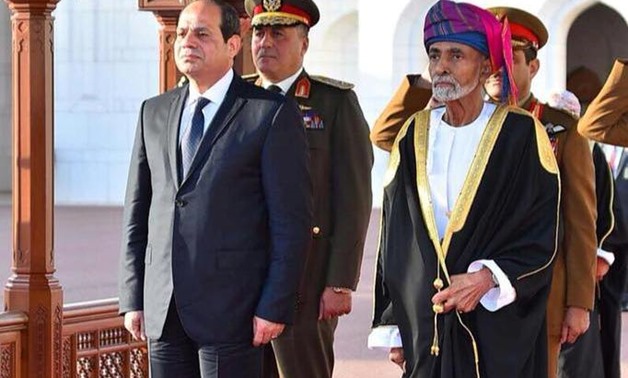
President Abdel Fatah al-Sisi meets with Sultan of Oman Qaboos bin Said al-Said at Muscat’s Al-Alam royal palace, February 4, 2018 - Press Photo
CAIRO – 5 February 2018: Foreign ministry spokesman Ahmed Abu Zeid praised the Sultanate of Oman as a wise country, with quiet diplomacy, and a long-term vision of Arab national security.
In an interview with Moataz Abdel-Fattah on ON Live on Sunday, Abu Zeid said that Oman’s attitudes towards Egypt reflect the country’s great wisdom. Sisi’s visit to Oman came within the framework of Sisi’s comprehensive plan to negotiate with Arab leaders before the Arab summit 2018, which is set to be in March, in Saudi Arabia’s capital of Riyadh, Abu Zeid added.
President Abdel Fatah al-Sisi headed to Muscat on Sunday for the first time since he took office, upon an invitation from Sultan of Oman Qaboos bin Said.
Talks between the two leaders addressed economic cooperation and trade deals. They also tackled the recent issues in the region, where Sultan Qaboos reviewed his vision to solve the Yemeni crisis in a way that can ease the suffering of Yemeni people. The two leaders also discussed other regional issues in Syria, Lebanon and Iraq.
Upon arrival at Muscat’s Al-Alam royal palace, Sisi was warmly welcomed by Sultan Qaboos. Qaboos valued Egypt’s role in enhancing Gulf’s stability and security, confirming Egyptian-Omani deep relations and strong cooperation and friendship, according to presidential spokesperson Bassam Radi.
In regard to Egyptian-Sudanese relations, Abu Zeid said people of both nations are concerned about the tensions between the two countries.
Sisi’s meeting with his Sudanese counterpart Omar al-Bashir was very important and transparent, Abu Zeid said, adding, the two presidents agreed to hold periodic discussions of issues of mutual interest.
Sisi, Bashir and Ethiopian Prime Minister Hailemariam Desalegn met on Monday at Sisi's presidential residence in Addis Ababa. The tripartite summit discussed means of enhancing cooperation between the three countries, continuing intensive consultation, and coordination on various subjects of common interest.
.jpg)
Egypt’s President Abdel Fatah al-Sisi (R), Ethiopian Prime Minister Hailemariam Desalegn (C) and Sudanese counterpart, Omar Hassan al-Bashir (L) during a tripartite meeting at the AU's 30th summit, January 29, 2018 – Press photo
Bashir expressed his country’s intention to work within the framework of the tripartite national committee in order to reach consensus on all outstanding technical issues.
In a statement on Sunday, Abu Zeid said that Egypt will host a quartet meeting with the Egyptian and Sudanese ministers of Foreign Affairs and heads of intelligence bodies of both countries on Thursday to discuss the bilateral relations that have been strained recently.
Egypt’s relations with Sudan were recently strained over the disputed border area of Halaib and Shalateen; on December 23, 2017, Sudan filed a complaint to the United Nations Secretariat, protesting a maritime border demarcation deal between Egypt and Saudi Arabia as the deal denotes the territory as Egyptian on the maps.
Halaib and Shalateen, or the Halaib Triangle, is an area of land measuring 20,580 square kilometers, located on the Egyptian-Sudanese border on the Red Sea coast. It is part of the Red Sea governorate and consists of three major towns – Halaib (which became a city in February 2014), Abu Ramad and Shalateen.
On January 13, Russia Today has reported that the Sudanese Ambassador to Cairo Abdel Mahmoud Abdel Halim, who has been withdrawn from Egypt for consultation, told Sudanese reporters that Khartoum “has taken tougher steps against Cairo and new development will take place in the coming few days and will be more violent.”
“We are at the beginning of our diplomatic process, which starts with summoning the ambassador for consultation and then withdrawing the ambassador, and third, dismissing the ambassador of the concerned country. Fourth, boycotting the diplomatic ties and fifth, declaring war,” stated an Egyptian government official.
However, after Sisi and Bashir’s meeting, the Egyptian Foreign Ministry said that the Sudanese ambassador will return back to Cairo to resume his post soon.

.jpg)
Comments
Leave a Comment